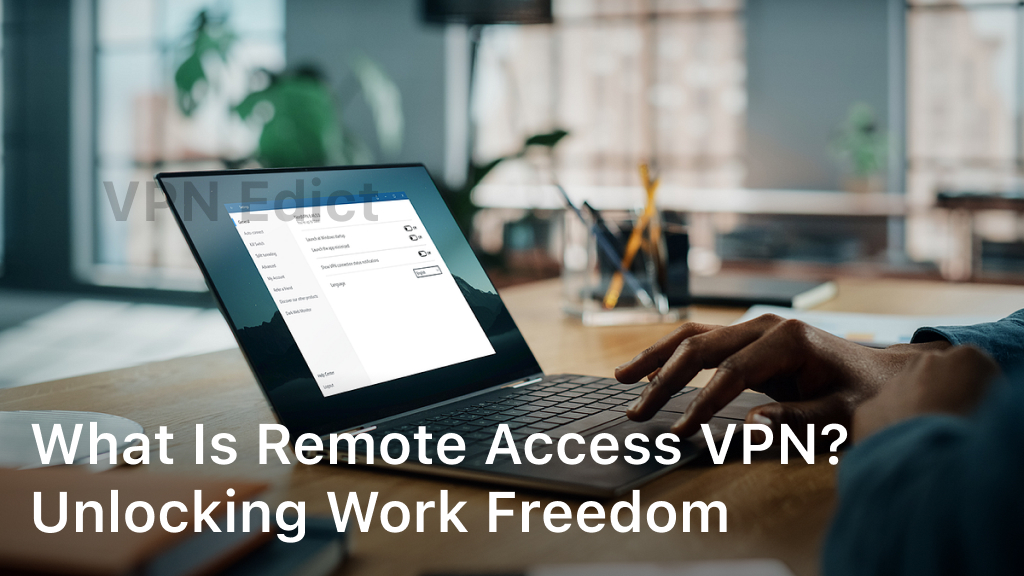What is Remote Access VPN? Unlocking Work Freedom
If you’re someone who values work flexibility, you’ve probably heard the term “remote access VPN” before. But what exactly does it mean? In simple terms, a remote access VPN is a secure way to connect to a corporate network from anywhere in the world. It allows you to access the same resources and files you would have if you were physically in the office, from the comfort of your own home or while on the go.
In this section, we will dive deep into what remote access VPNs are all about. We will explore their definition, how they work, and the benefits they offer to professionals like you. By the end of this section, you will have a comprehensive understanding of remote access VPNs and how they can unlock work freedom for you.

Benefits of Remote Access VPN
If you are looking for ways to enhance your work flexibility, a remote access VPN may be just what you need. Here are some key benefits that remote access VPNs offer:
- Enhanced Security: Remote access VPNs provide a secure and private connection to corporate networks, keeping your sensitive data protected from cyber threats.
- Flexibility: With a remote access VPN, you can work from any location, whether you’re at home, on the go, or traveling.
- Increased Productivity: Remote access VPNs enable you to access your workplace’s resources and applications, helping you to be more efficient and productive.
These are just a few of the many benefits of using a remote access VPN. Whether you’re a freelancer, remote worker, or business owner, a remote access VPN can provide you with unparalleled work freedom and security.
Features of Remote Access VPN
Remote access VPNs come with a range of key features that make them a popular choice for professionals seeking flexibility and security. Below are some of the most essential features of remote access VPNs:
| Feature | Description |
|---|---|
| Encryption | Remote access VPNs encrypt all data being transmitted between the user’s device and the corporate network, ensuring that sensitive information is protected from interception by cybercriminals. |
| Authentication | Remote access VPNs require users to authenticate themselves before they can connect to the network, adding an extra layer of security and reducing the risk of unauthorized access. |
| Protocol support | Remote access VPNs typically support a range of protocols, including PPTP, L2TP/IPsec, and OpenVPN, allowing users to select the most suitable option for their needs. |
| Compatibility | Remote access VPNs can be used on a variety of devices and operating systems, including desktops, laptops, tablets, and smartphones, making them a versatile solution for remote work. |
| User-friendly interface | Remote access VPNs often have intuitive interfaces that allow users to quickly and easily connect to the network, without the need for technical expertise. |
By understanding these key features, you can gain a better understanding of the capabilities and limitations of remote access VPNs. These features work together to provide a secure, reliable, and user-friendly remote work experience.
How Remote Access VPN Works
Remote access VPNs enable secure and private connections to corporate networks, allowing users to access network resources from any location. This is achieved through the use of encryption protocols and authentication methods that ensure the confidentiality and integrity of data transmitted over the internet.
When a remote user connects to a VPN server, their device encrypts all data before it is transmitted over the internet. Encryption ensures that sensitive information remains confidential even if intercepted by third-party attackers.
Authentication methods are used to verify the identity of the remote user before granting them access to the VPN. This ensures that only authorized users have access to the network and sensitive data.
Remote access VPNs use a variety of encryption protocols, including:
- IPsec (Internet Protocol Security)
- SSL/TLS (Secure Sockets Layer/Transport Layer Security)
- PPTP (Point-to-Point Tunneling Protocol)
- L2TP (Layer 2 Tunneling Protocol)
The choice of protocol depends on the specific needs of the organization, such as the level of security required and the devices used by employees.
Choosing the Right Remote Access VPN Service
When it comes to selecting a remote access VPN service, not all providers are created equal. To ensure you make an informed choice that meets your specific needs, there are several factors you should consider. Below are some key tips to keep in mind when choosing a remote access VPN service:
Reputation and Reliability
Look for well-established and reputable providers with a track record of reliability and security. Research online reviews and ratings to ensure you are choosing a trustworthy company.
Security Features
Your chosen VPN service should offer advanced security features, such as robust encryption and multi-factor authentication. This will help keep your sensitive data and online activity secure from cyber threats.
Network Coverage
Check whether your chosen VPN service has a global network of servers to ensure consistent and reliable remote access from anywhere in the world.
User-Friendliness
To make the most of your remote access VPN, it’s important to choose a provider with an intuitive and user-friendly interface. Look for a service that offers simple setup and configuration, as well as responsive customer support.
Pricing and Plans
Finally, evaluate different VPN service providers based on their pricing and plan options. Choose a provider that offers flexible and affordable subscription plans that align with your budget and usage needs.
Ensuring Security with Remote Access VPNs
When it comes to remote work, security should be a top priority. Fortunately, remote access VPNs offer a variety of security measures and best practices to minimize the risks associated with remote work. By implementing these measures, you can protect your sensitive information and ensure secure connections to your corporate network.
Multi-Factor Authentication
One effective way to enhance security when using remote access VPNs is through multi-factor authentication. This involves using two or more methods of authentication, such as a password and a fingerprint scan, to verify your identity before accessing your network. By requiring multiple factors, it becomes more difficult for hackers to gain access to your sensitive information.
Network Monitoring
Another important security measure to implement when using remote access VPNs is network monitoring. This involves monitoring your network for any suspicious activity, such as unauthorized access attempts or unusual data transfers. By being proactive and detecting potential threats early on, you can minimize the damage caused by a security breach.
Regular Updates and Maintenance
To ensure the ongoing security of your remote access VPN, it’s also important to keep the software up-to-date and perform regular maintenance. This includes applying security patches, updating antivirus software, and regularly testing your network for vulnerabilities. By staying current with updates and maintenance, you can minimize the risk of security breaches and ensure the ongoing protection of your sensitive information.
Real-World Applications of Remote Access VPNs
Remote Access VPNs have revolutionized how people work. They are used by various industries and job roles to facilitate remote work and offer unparalleled flexibility. Let’s explore some real-world scenarios where Remote Access VPNs have made a significant impact:
Healthcare
Doctors and nurses can access electronic health records remotely through a Remote Access VPN, allowing them to provide medical care to patients in rural or remote areas. This ensures timely and accurate health services to people in need.
Finance
Remote Access VPNs provide secure access to financial data, enabling finance professionals to work from home while ensuring confidentiality and data protection. This also allows banks and financial institutions to cut down on real estate and other operational costs.
Education
With Remote Access VPNs, teachers and students can access educational resources and communicate with each other without being bound by location or time. This has made education more accessible and adaptive, enabling people to learn from anywhere in the world.
Technology
Remote Access VPNs enable tech support teams to access company servers and assist employees and customers, regardless of location. Furthermore, they allow developers to work remotely, promoting collaboration regardless of time zones and geography.
These are just a few examples of the incredible ways in which Remote Access VPNs are transforming how we work. This technology offers virtually unlimited potential and is likely to shape the future of work for years to come.
Conclusion
In conclusion, remote access VPNs are an essential tool for any professional looking to work remotely. By allowing users to securely connect to their corporate network from anywhere in the world, remote access VPNs empower remote workers with unparalleled flexibility and productivity. In this article, we have discussed the definition, benefits, features, and applications of remote access VPNs, as well as the best practices for ensuring their security.
Whether you are a freelancer, an entrepreneur, or an employee, remote access VPNs can revolutionize the way you work. With the right service provider and implementation strategy, you can enjoy the benefits of remote work without compromising your data privacy or security.
As technology continues to advance and the world becomes increasingly digitized, remote access VPNs will become even more critical for professionals across all industries. We encourage you to explore the world of remote access VPNs and find the solution that best fits your needs.
FAQ
What is a remote access VPN?
A remote access VPN, or virtual private network, is a secure and encrypted connection that allows users to access a private network remotely. It enables individuals to connect to their work networks or other private networks over the internet, ensuring privacy and data protection.
What are the benefits of using a remote access VPN?
Using a remote access VPN offers several advantages. It allows for secure access to company resources from anywhere, enhancing work flexibility. Additionally, remote access VPNs safeguard sensitive data and protect against cyber threats, ensuring peace of mind for remote workers.
What features do remote access VPNs offer?
Remote access VPNs provide various features to enhance the remote work experience. These include secure encryption protocols, multi-factor authentication, and seamless connectivity across different devices. They also offer split tunneling, allowing users to access both local and remote networks simultaneously.
How does a remote access VPN work?
When you connect to a remote access VPN, your device establishes an encrypted tunnel between your computer and the remote network. This tunnel ensures that your data remains secure while being transmitted over the internet. It also provides authentication mechanisms to verify your identity and ensure only authorized users can access the network.
How can I choose the right remote access VPN service?
When selecting a remote access VPN service, consider factors such as security features, compatibility with your devices, user-friendliness, and customer support. It’s important to choose a reputable provider that suits your specific needs and offers reliable connectivity and data protection.
What security measures should I implement when using a remote access VPN?
To ensure security when using a remote access VPN, you can implement measures such as enabling multi-factor authentication, regularly updating your VPN client, and using strong and unique passwords. It’s also crucial to be cautious of phishing attempts and avoid connecting to unsecured networks while using the VPN.
In which real-world scenarios are remote access VPNs used?
Remote access VPNs are widely used across various industries and job roles. They enable remote workers to securely access corporate networks, facilitate telecommuting, and support collaboration among distributed teams. Additionally, remote access VPNs are utilized by professionals who require secure access to critical applications and services while away from the office.




